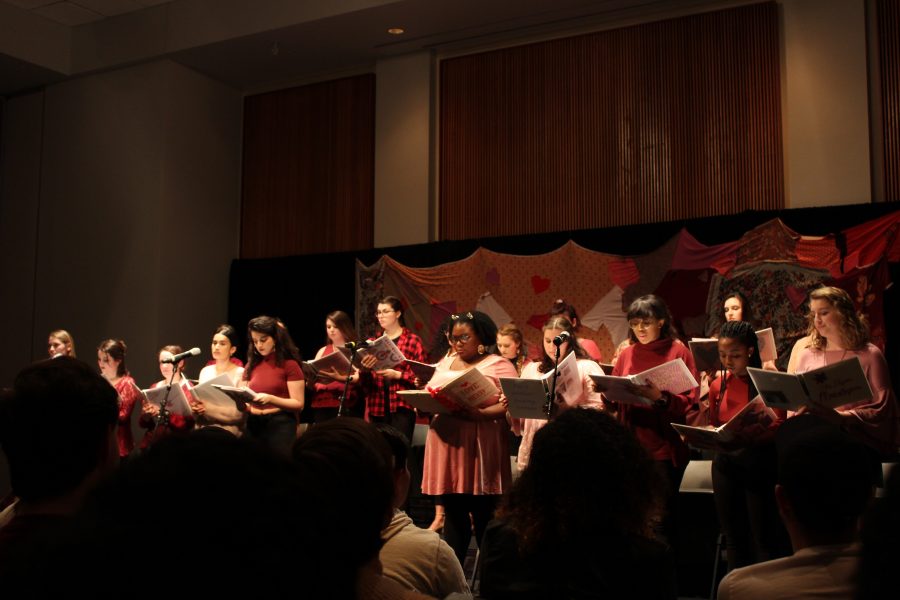Let’s talk about vaginas.
“The word sounds like a medical condition,” says one of the performers in Loyola’s second annual performance of “The Vagina Monologues,” which took place on Wednesday, Feb. 13, and Thursday, Feb. 14.
She’s not wrong: we treat vaginas with the same kind of contempt as a medical condition, despite the fact that over half the population has one. We’ve been trained to see them as either that gross, mysterious thing between our legs, or hyper-sexualized tools to make women feel ashamed. “The Vagina Monologues” seeks to end these perceptions, as well as promote pride, confidence and acceptance in vaginas and their owners.
Originally created by playwright Eve Ensler and first performed in 1996, “The Vagina Monologues” are real monologues by real women. The performance is known as the V-day movement, which has grown to include over 5,800 annual events worldwide and raised over 100 million dollars. V-day is “a global, grassroots movement dedicated to generating broader attention to issues of violence against women and girls. The movement raises funds for victims of rape, battery, incest, female genital mutilation (FGM), and sex slavery.”
“The Vagina Monologues were introduced to Loyola by the female empowerment group Mosaic: A Women of Color Initiative.
“It’s this group of strong, awesome women who put this on,” said Marley Scheld ‘20, who performed the monologue “The Vagina Workshop.” “I wanted to be part of this, and it was so much fun.”
The setting of the stage consisted of large swathes of pink, red, and flowered fabric with bras and shirts attached and interwoven between them. Pink, red and white hearts were taped to the walls with sayings like: “Viva la Vulva,” “Pussy Power,” and “I want to see you.”
Seated on the elevated stage at the front of McGuire Hall, 21 female students dressed in pink and red performed monologues that talked all about vaginas. This included the names for vaginas, why we’re worried about vaginas, the fact that we should be building a community for vaginas, what our vaginas would say if they could talk, or what they would wear. Outfits for vaginas ranged from wearing only diamonds, to combat boots, to anything comfortable, to Armani. Only Armani.
Each monologue had its own title and discussed various topics including how vaginas smell, taste, look, and feel. They talked about sex, orgasms, insecurities and confusion about vaginas, discovering and accepting your sexuality, sexual assault, feeling shame regarding vaginas, finding confidence because of vaginas, and taking pride in vaginas and finally loving them.
The monologues work to make women in the audience realize that their vaginas are a part of who they are.
When asked about why this event was significant, co-director Serina Addona ’19 said, “Female empowerment is so important, especially with the ‘Time’s Up’ era we’re in now. Last year and this year when we wanted to put this on there was a lot of push-back, which, to me, just shows how important it is to have these discussions.”
More and more people seem to be finding that now is a crucial time to be having intentional conversations about vaginas and female empowerment, especially with the current presidential administration and restrictions on women and their bodies in the U.S.
Another performer in “The Vagina Monologues,” Natalie Lana ‘20, said that she joined because she believed in the power of communication.
“For so long women were ignored and silenced in our society. It’s so important to shares stories and experiences so we don’t feel so alone. Having this event at Loyola is a critical step in creating a fully inclusive and interactive community,” Lana said.
The Monologues were hilarious, enlightening, and inspiring. One sophomore, who preferred to remain anonymous, said, “I loved it, it was so empowering. I went out that night and have never felt more comfortable with my body.”




















































































































Anonymous • Feb 26, 2018 at 10:33 pm
5